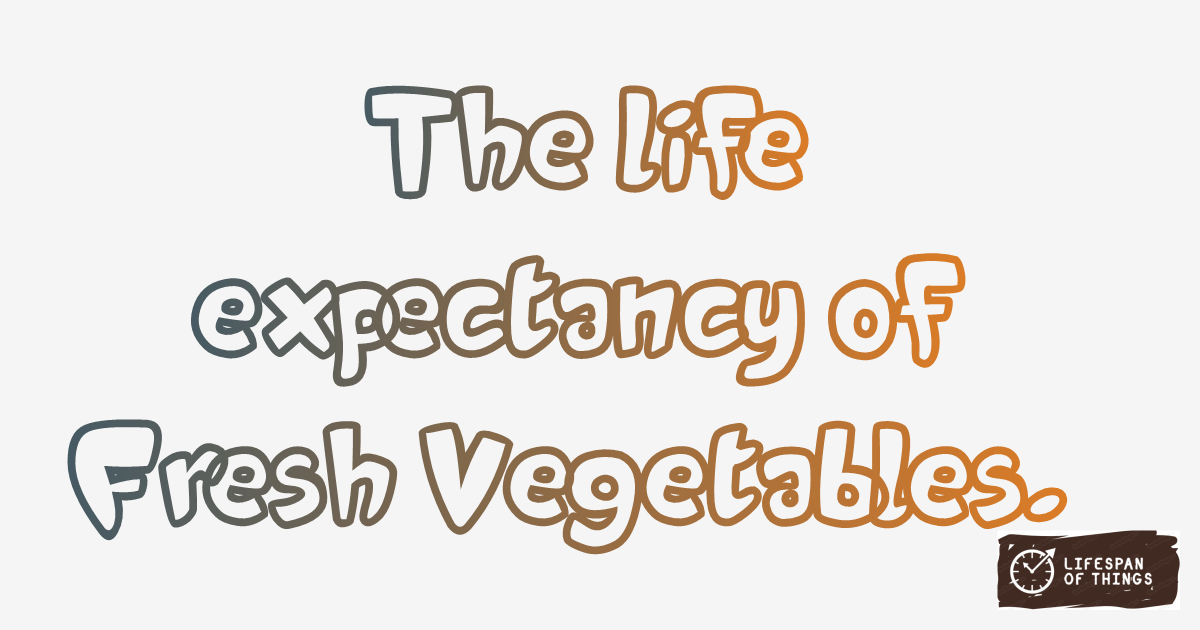
7 - 10 Days
Lifespan of Fresh Vegetables is 7 - 10 Days. The freshness of Fresh Vegetables can be influenced by factors like proper storage, handling, and exposure to light and moisture. To extend the lifespan of Fresh Vegetables, store them in a cool, dry place, away from direct sunlight and moisture. Avoid overcrowding in the storage container to allow for air circulation and reduce the risk of spoilage.
Useful Information
For optimal freshness, store Fresh Vegetables in the refrigerator crisper drawer or a perforated plastic bag to maintain humidity. Avoid washing them before storage and only wash right before use. Check for any signs of wilting or spoilage, removing any damaged pieces to prevent the spread to the rest of the vegetables.
Fresh Vegetables are packed with essential nutrients like vitamins A, C, and K, as well as dietary fiber. These nutrients support overall health, immune function, and digestion. Incorporating Fresh Vegetables into your diet can provide a range of health benefits, including improved digestion and reduced risk of chronic diseases.
Fresh Vegetables are versatile ingredients used in salads, stir-fries, soups, and as side dishes. They can also be juiced for a nutritious beverage option. Popular dishes featuring Fresh Vegetables include vegetable stir-fry, salads with various toppings, and vegetable-based soups like minestrone. Experiment with different cooking methods to enjoy Fresh Vegetables in a variety of ways.
To ensure food safety, inspect Fresh Vegetables for any signs of spoilage like mold, slime, or off smells. If affected, discard the spoiled portions and consume the remaining vegetables promptly. Properly handle and clean cutting boards and knives used for cutting Fresh Vegetables to prevent cross-contamination. Store any leftover cooked vegetables in airtight containers in the refrigerator and consume within a few days.
Learn about the importance of food safety practices when handling Perishables to prevent contamination and foodborne illnesses. Read more
When purchasing Fresh Vegetables, opt for organic or locally sourced options to support sustainable farming practices. Choosing seasonal produce can also reduce environmental impact and promote freshness. Consider growing your own vegetables at home to control sourcing and ensure a more sustainable supply chain. By prioritizing sustainable practices in your vegetable choices, you can contribute to a healthier planet.
Lifespan Comparisons
| Compared Item | Comparison Description |
|---|---|
| Lifespan of Dairy Products | Fresh vegetables and dairy products have a similar lifespan of around 7-10 days, making them perishable items ideal for immediate consumption. |
| Lifespan of Fresh Meats | Fresh vegetables outlast fresh meats by 2-3 days, providing a longer window for meal preparation and consumption. |
| Lifespan of Seafood | While fresh vegetables last a week, seafood can be stored for several years, offering a significantly longer shelf life for meal planning and storage. |
| Lifespan of Fresh Fruits | Fresh vegetables and fresh fruits share a similar lifespan of 5-7 days, requiring timely consumption to maximize freshness and nutritional benefits. |
| Lifespan of Milk | Both milk and fresh vegetables have a lifespan of 7-10 days, requiring regular monitoring to prevent spoilage and ensure food safety. |
| Lifespan of Canola Oil | Compared to fresh vegetables, canola oil has a significantly longer lifespan of 2-5 years, making it a staple pantry item with a much longer shelf life. |
| Lifespan of Balsamic Vinegar | Balsamic vinegar shares a similar lifespan range of 2-5 years with fresh vegetables, offering a versatile pantry staple for enhancing flavors in cooking. |
| Lifespan of Apple Cider Vinegar | Apple cider vinegar, lasting 2-5 years, can be stored for an extended period compared to fresh vegetables, offering various health benefits and culinary uses. |
| Lifespan of Sleeping Bags | While fresh vegetables need to be consumed within a week, items like sleeping bags have a lifespan ranging from 5-10 years, ensuring long-lasting comfort during outdoor adventures. |
| Lifespan of Backpacks | Backpacks, lasting 5-10 years, provide durable storage solutions for outdoor enthusiasts compared to the short lifespan of fresh vegetables. |
| Lifespan of Camping Stoves | Camping stoves offer a lifespan of 5-10 years, making them reliable cooking companions for outdoor activities, contrasting with the short shelf life of fresh vegetables. |
| Lifespan of Camping Chairs | Fresh vegetables spoil within 7-10 days, while camping chairs last 5-10 years, providing comfortable seating options for outdoor adventures over an extended period. |
| Lifespan of Imaging Devices | Imaging devices have a lifespan of 5-15 years, lasting significantly longer than fresh vegetables and offering advanced diagnostic capabilities in various fields. |
| Lifespan of Lab Equipment | Lab equipment, with a lifespan of 10-15 years, ensures long-term research capabilities compared to the short shelf life of fresh vegetables, supporting scientific advancements. |
| Lifespan of Endoscopy Devices | Endoscopy devices offer a lifespan of 5-10 years, lasting longer than fresh vegetables and providing essential medical imaging capabilities for diagnostic procedures. |
Frequently Asked Questions
Lifespan of Fresh Vegetables is 7 - 10 Days.
Store Fresh Vegetables in the refrigerator crisper drawer or a perforated plastic bag to maintain humidity and avoid washing them before storage.
Fresh Vegetables are packed with essential nutrients like vitamins A, C, K, and dietary fiber, supporting overall health and immune function.
Fresh Vegetables are versatile ingredients used in salads, stir-fries, soups, and juicing for a nutritious beverage option.
Inspect Fresh Vegetables for signs of mold, slime, or off smells, and if affected, discard spoiled portions promptly.
Choosing organic or locally sourced Fresh Vegetables supports sustainable farming practices and reduces environmental impact.







